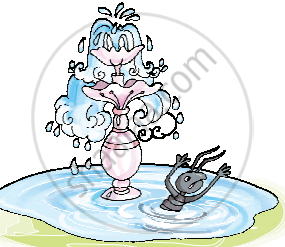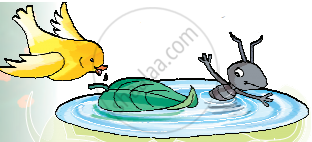Advertisements
Advertisements
Question
Listen carefully to the story being read out and answer the questions.
A boy was flying a kite with his father. He was excited to watch the kite soar high and asked his father, “What kept the kite up?” Dad replied “The String”. The boy said, “No dad, the string is holding the kite down.” The father suddenly broke the string, the kite came crashing down. Now the boy understood, what was holding the kite up. This is true in life as well. We are, advised to follow a set of rules or a prescribed code of conduct to enable us to reach our full potential. However, very often we hear the phrase “I want to be free.” If you take the train off the track, it is free. But where would it go? If each one of us follows our own traffic rules and drive on any side of the road what would you call it? Freedom or chaos? By observing rules we are actually gaining freedom. This is what. discipline is all about.
1. According to the father what kept the kite up?
- the kite itself
- air
- the string
- father’s skills
2. The string helped the kite to ______.
- withstand the pressure
- break free
- crash
- soar high
3. To realize our full potential, we should ______.
- obey our elders
- follow a set of rules
- work hard
- plan well
4. A train should go on the ______to reach its destination.
- track
- line
- road
- path
5. To realize our full potential, we should ______.
- obey our elders
- follow a set of rules
- work hard
- plan well
6. Taking freedom in our own hands will lead to ______.
- self-discipline
- chaos
- a code of conduct
- freedom
7. The main idea of the passage is ______.
- the art of flying kites
- father’s advice to his son
- the importance of discipline
- the right to freedom
Solution
- The string
- The string helped the kite to soar high.
- To realize our full potential, we should follow a set of rules.
- A train should go on the track to reach its destination.
- To realize our full potential, we should chaos.
- Taking freedom in our own hands will lead to the importance of discipline.
- The main idea of the passage is the right to freedom.
APPEARS IN
RELATED QUESTIONS
Read the poem aloud.
Listen carefully and guess how the sentence would end.
Once there was a crow. He was very thirsty.
He wanted to drink ______ ______.
In 394 BCE, the ________ stopped the Greek Olympic Games, because they didn’t like them.
Listen to the passage about Nammazhwar, an environmental crusader from Tamil Nadu. As you listen, answer the following questions. The listening act can be repeated if required.
Who is Nammazhwar? What is his contribution to farmers and farming?
Listen to the passage about Nammazhwar, an environmental crusader from Tamil Nadu. As you listen, answer the following question. The listening act can be repeated if required.
What was the turning point in the life of Nammazhwar?
Why did Chatur Pandit ask the king for 1000 gold coins?
State whether the statement is true or false.
The brothers have decided to borrow money for the wedding anniversary celebration.
______ does not happen overnight.
A strong foundation for any individual comes from being with a __________.
The gulls were flying over the ______.
You must check on the __________ and __________ for the train of your choice.
Santhiya can’t live without her mobile phone.
Where does Santhiya keep her mobile?
Her mobile phone is also a kind of ______.
Raj’s pain of not doing well in his test was compared with ______ of pencils.
Where does this story take place?
Listen to the flash news. Read the question given below, then listen to the flash news again and complete the response.
When did it escape?
Road users can show that they are considerate on the road by.
Skiing offers opportunities to delve into oceans.
Listen to the audio and answer the following.
Did Shabeena go to Jacklin's house?
- Yes
- No
There are many children outside.
She hold her mom's hand very tight.
Listen to the following paragraph.
|
The Ant and the Dove On his way home, an ant saw a sparkling fountain. He crawled onto its wall to take a closer look.
Suddenly he slipped and fell into the water. He gurgled and panicked and waved his legs in the air. “Help! I can't swim,” he cried. Luckily, just at that moment, a friendly dove flew by. She saw that the tiny ant was drowning and quickly flew to a nearby tree. She pulled off a leaf and let it glide down to the ant. “Here you are,” she cooed and flew away.
(Adapted from Aesop’s Fables) |
- Why do you think the dove helped the ant?
- How do you think the ant felt on finding the leaf?
- Have you ever been in trouble like the ant? Did anyone help you?
Fun with sounds
| pleasure | treasure | - | measure |
| wear | tear | - | - |
| stare | where | - | - |
| planned | canned | scanned | strand |
| topsy-turvy | hurly-burly | hurly-burly | curly-whirly |
Let’s practice with P and F.
| pleased | pricked | pinched | punished |
| fat | fruit | fell | forgotten |
| palm | pair | proud | parade |
| farm | fare | frown | fish |
Read out the following phrases aloud. Divide them into loud and softer sounds.
- clapping hands
- a worm moving
- stamping feet
- a bud blooming
- a butterfly flying
- a feather dropping
- an ant walking
- a car moving
- the wind blowing
- ssshhhh
- whisper
- tiptoe
- a leaf falling
| Loud sounds | Softer sounds |
Listen to the words
Come in, come in Go out, go out
What word signs have you seen or heard –
| at home | |
| at the vegetable shop | |
| at the library | |
| at the doctor’s place | |
| at the bus stop | |
| at the toy shop |
Complete the following dialogue between a doctor and a patient with ten sets of utterances for the following situation in which a person goes to a doctor for treatment. The doctor wishes to give him/ her an injection. The person is scared. The doctor convinces the patient and administers the injection. Now, in pairs, enact the dialogue in the classroom.
The Art Museum at Trivandrum is called ______.


